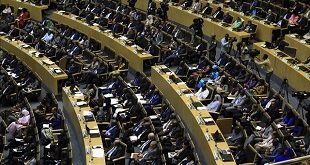
By The Independent Team
With big strides made against both malaria and pneumococcal disease, Rwanda is on track to meet UN Millennium Development Goal number four, the reduction of child mortality, officials say.

“Rwanda is one of the few countries in Africa that stands a chance of reaching the MDG targets if the current rhythm is maintained,” said Lamine Cisse Sarr, World Health Organisation representative to Rwanda.
“We still have a long way to go but in the last 20 months we have made a lot of progress,” Agnes Binagwaho, a medical doctor and permanent secretary in Rwanda’s ministry of health said.
UN Secretary General Ban Ki-moon earlier this month said Rwanda had made “great strides” in working toward the MDGs, “particularly in the area of maternal and children’s health.”
Maternal mortality has declined by more than one-third in nearly two decades, UN agencies said on Wednesday, although Africa and South Asia bear the overhwhelming burden of deaths in childbirth.
The UN Children’s Fund (UNICEF), the World Bank and the World Health Organisation warned in a report that the rate of progress was too slow.
It was well below the global target of a three quarters cut in maternal mortality ratio under the 2015 UN Millenium Development Goals, they said.
The number of women dying due to complications during pregnancy and childbirth fell by 34 percent from about 546,000 in 1990 to 358,000 in 2008, according to the report, “Trends in Maternal Mortality”.
“The global reduction in maternal death rates is encouraging news,” says Dr Margaret Chan, the Director-General of WHO.
Chan pinned the progress on the presence of more trained midwives and strengthening health care for pregnant women.
“No woman should die due to inadequate access to family planning and to pregnancy and delivery care,” she added.
Ninety-nine percent of such deaths occured in developing nations, while sub-Saharan Africa and South Asia accounted for 87 percent of maternal mortality in the world.
The fastest progress was achieved in Asia, where the number of maternal deaths was more than halved, from 315,000 to 139,000 between 1990 and 2008.
“Maternal deaths are both caused by poverty and are a cause of it,” said Tamar Manuelyan Atinc, vice president for human development at the World Bank.
More progress would involve reaching deeper into rural areas and poorer households, the agencies argued.
Better health care for women from ethnic minorities and indigenous groups, as well as for women with HIV and in conflict zones, would also help.
Now that Rwanda has significantly curtailed malaria, the biggest child killer is pneumonia.
“Out of every five children that die, one dies of pneumonia. Twenty-three percent of all child deaths in Rwanda are caused by pneumonia,” Unicef Rwanda representative Joseph Fumbi told journalists.
Few care givers in the developing world are able to recognise the symptoms of pneumonia — rapid and difficult breathing.

Rwanda has given basic training to lay people at community level enabling them to detect symptoms, administer antibiotics if necessary and transfer complicated cases to hospital.
A quasi-obligatory health insurance typically covers 90 percent of treatment costs, leaving just 10 percent for the family. If the family is too poor to cover even that, hospital doctors often chip in.
Donata Nyirabahizi, who lives in a small mud-walled hut with panoramic views over Lake Muhazi, learned the hard way how quickly pneumonia can prove fatal.
She lost a baby of 18 months three years ago to pneumonia. He died as his parents carried him to the nearest health centre.
“I realised on the Saturday that the baby was sick. When he started having difficulty breathing on the Monday I took him to the health centre.”
She described, eyes downcast, how the child had started gasping and then ceased breathing altogether.
“My husband took him off my back and handed him to me. He was dead.”
Clementine Mukandori was luckier. The referral system meant that she and her baby son Yves were directed to Kigali’s university teaching hospital (CHUK). Yves sits on a bed with an oxygen mask attached with green tape. He will likely be discharged in five to seven days.
And the situation is set to improve further.
In April 2009 Rwanda introduced, with funding from GAVI Alliance, a vaccine against pneumococcal disease — the leading cause of pneumonia, also responsible for other infections including meningitis and sepsis — among the jabs obligatory for babies, becoming the first developing country to do so.
GAVI is a public-private partnership that develops and supports innovative ways to increase immunisation in developing countries.
Pauline Mukabalisa, a 46-year-old community health worker, says she has already seen an improvement
“These days no one is dying from pneumonia,” she told journalists.
Rwanda has already made great strides in combatting malaria with the distribution of free bednets treated with insecticide, Florent Rutagarama, a paedatrician at CHUK said.
Whereas prior to the introduction of nets, malaria used to account for one quarter of all hospitalisations, “cases are now very rare. We can go a whole month before getting a positive blood smear in the paedatric wards,” he said.
“Now we have good results with pneumoccocal disease, digestive disease is now on top” of our list of priorities, Binagwaho said.
Once Rwanda introduces the Rota virus vaccine to fight diarrhoea, its next priority will be the HPV vaccine to protect women against cervical cancer.
These were amongst the progress that was discussed in a joint review of Africa’s progress toward meeting its Millennium development goals on Sept 20. Overall, the UN Economic Commission on Africa and the Organization for Economic Cooperation and Development found that the results have been mixed.
“For instance, there have been considerable advances in areas such as governance, peace and security, primary education and the reduction of extreme poverty,” the report said.
“But enormous challenges remain, including accelerating the rate of progress in bringing clean water and basic sanitation, and reducing the unacceptable levels of maternal and child mortality,” it said.
The gains that had been made helped Africa weather the global economic crisis but its impact was severe nonetheless, it said.
The United Nations and the OECD called Monday on rich nations to increase development aid to Africa, warning that it faces “steeper challenges” as a result of the global economic crisis.
However, President Paul Kagame offered a contrasting view, saying that MDGs can only be met if poor countries take a more active role in realizing them rather than looking to donors for more assistance.
‘Despite their good intentions,’ said Kagame, ‘their perspective is often predicated on paternalism not partnership, on charity not self-reliance, and on promises unfulfilled rather than real change on the ground.’
The developing world, ‘can no longer rely on the goodwill of other nations,’ said Kagame. ‘We neither need to, nor should we want to. We must assume effective leadership, take full ownership of the development of our countries and truly deliver for our citizens.’
Economic growth in Africa went from an average of about six percent in 2006-2008 to 2.2 percent in 2009, which meant that growth per capita had come to a “near standstill.”
Although Africa’s economies are forecast to improve this year and next, the setback in 2009 “has left the legacy of significantly greater challenges over the five year period remaining, to 2015,” it said.
The Millennium Development Goals, set in 2000, call for reducing extreme poverty in the world by 2015, while at the same time promoting education, sexual equality, maternal health, protecting the environment and combatting infant mortality, AIDS, and malaria.
The progress report’s release was timed to coincide with the opening in New York of a three day summit devoted to the Millenium Development Goals. Leaders from 192 countries will be represented at the summit, which is being held before the start of the UN General Assembly.
Africa’s progress has been “slow” in recent years in terms of agriculture and food security, climate change, energy, environmental sustainability, water and sanitation, according to the report’s authors.
They said it was clear that wealthy countries would not live up to the commitments they made five years ago to double aid to Africa by 2010.
What is more, Africa’s share of the world’s total development aid has dropped from more than 40 percent in 1990 to around 30 to 35 percent since 2000, the report said.
At the same time, the proportion of the world’s poor who live in Africa has climbed and is expected to reach around 40 percent in 2015, it said.
Rich countries should respond by increasing the share of development aid that goes to Africa, the report said.
They must also strengthen their support in the areas of economic governance, particularly in the area of fiscal management so that African countries can collect more revenues internally and be less dependent on foreign aid.
For their part, African states must redouble their efforts to promote regional integration, the essential precondition for greater trade between African countries, and put in place basic infrastructure.
 The Independent Uganda: You get the Truth we Pay the Price
The Independent Uganda: You get the Truth we Pay the Price


